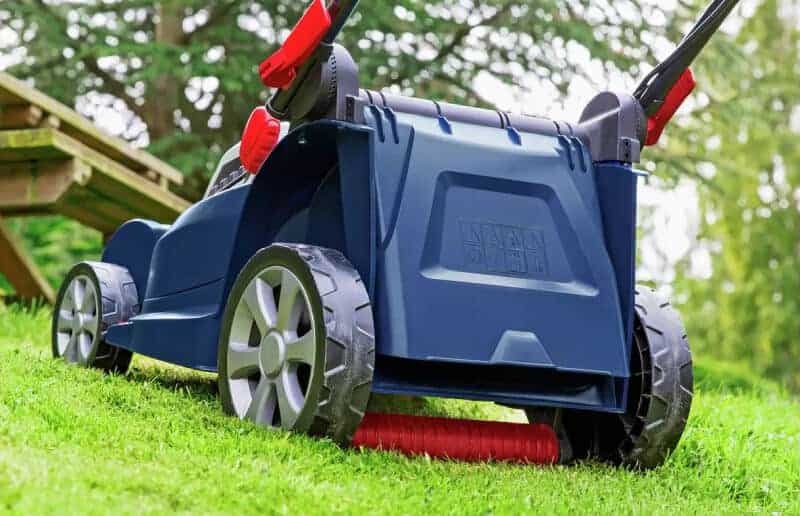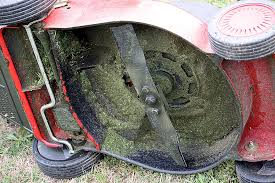It's time to mow the grass. Not having been mown for sometime it's a bit on the long side, some might say overgrown. Anyway, the mower hasn't been used since the end of last summer, so it needs an outing and the lawn needs a good haircut. Today's as good as any to cut the lawn.
These sorts of thoughts are probably going through nearly every gardener's mind as volitile spring gives way to the longer, warmer days of summer.

So, out comes the trusted electric lawn mower, extension cables unfurled or batteries fully charged. All ready to tackle the long grass.
After a little while the motor starts to labour and begins to lose power. Some of us will stop, figuring that the "poor thing" is overheating and needs a rest for five minutes. While there will be others who will carry on pushing the "blessèd thing" until it will start working properly, but will only have the motor cut out on them.
Both these types of people have lawn mowers that have overheated,and the motor needs to stop, not because it is a "poor thing" or it's a "blessèd thing", but because its become to hot and needs to cool down.
Owner No.1's so called compassion has probably caused little if any damage to his machine. While owner No.2's aggessive, work it 'till stops may have caused enough damage to markedly shorten his lawnmower's life.
Either way, both owners have neglected to do two things. The two things are very simple indeed. One involved taking maybe an hour during one of those cold boring winter evenings when there was nothing to watch on TV except repeats. While the second was a minute before getting stuck into mowing the long grass.
When it's too wet or too cold to mow the lawn or garden during the winter months, it's actually the ideal opportunity to do a little bit of maintenance on garden equipment. No "major surgery" need be performed, and its a way of prolonging an electric lawnmower's working life.
Every electric mower's motor is protected by a housing which will have vents at certain points to allow air to flow into, and around the motor vitally cooling it down to stop overheating. One weekness of having vents is that most certainly get clogged and blocked with grass cutting, debris, grit and grime. This accumulated gunk will after a short time, start to block the much needed airflow to and around the motor, stopping the air from cooling the motor down. The motor then starts to overheat and loses power as a result, and in extreme cases burning itself out and dying.

All that needs to be done with the vents is to clear them. By removing the housing and with a stiff brush and some soapy water, scrubbing each vent free of any obstruction will be one way of prolonging the life of the mower. After cleaning the vents, leave the housing to dry before re-fastening to the mower. It is also worth cleaning the base of the motor and casing with a soft bristle brush removing any grass and dust.
There is now just one last thing to do in the "workshop". Check that the cutting blade rotates smoothly. If the blade rotates with a rough griity feel, it's time to replace the bearing. To replace the bearing remove the cutting blade assembly and gently ease out the doughnut shaped bearing, this may take about five to ten minutes as bearings are designed to fit very snuggly. The part No. will be on the side of the bearing case and any agent or dealership will certaily stock it. That's it!
These two bits of maintenance will do wonders for the mower and will prolong its life. It also keeps mid-winter boredom at bay!
One thing about any lawnmower is that if its cutting height is too low for the job at hand. There will be just too much grass to cut at once, putting strain on the motor, making it work harder. When that happens the motor will start to overheat.To avoid putting undue strain on the lawnmower motor when starting to tackle an area of long grass, simply set the cutting height to its maximum height. Mow the area, and when done mow it again, but at the next setting down. Continue mowing, and at each pass reduce the cutting height by one, until the grass is at the right height.
OK. Cutting grass down in this way will take probably 4 to 5 times longer, but there are two very distinct benefits to this method of mowing. The first benefit is the finish of the lawn will be that much better afterwards. The second benefit is that it puts less undue strain on the electric mower's engine, thereby prolonging its working life and saving money on not having to purchase a new electric lawnmower for a little while longer.